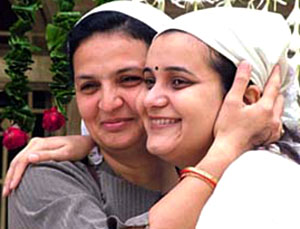 Parsi women occupy a much more honourable and independent position with regard to either their Mohammedan or Hindu sisters in society. As per scholars a high authority on Zoroastrian scriptures, `the position of a female was in ancient times much higher than it is nowadays. They are always mentioned as a necessary part of the religious community. They have the same religious rites as men; the spirits of deceased women are invoked as well as those of men.` A Parsi man usually makes an affectionate and good husband, and discharges honestly his matrimonial duties, and the woman is evenly conscious of her duties towards her master and lord. Thus their families normally lead a peaceful and happy life.
Parsi women occupy a much more honourable and independent position with regard to either their Mohammedan or Hindu sisters in society. As per scholars a high authority on Zoroastrian scriptures, `the position of a female was in ancient times much higher than it is nowadays. They are always mentioned as a necessary part of the religious community. They have the same religious rites as men; the spirits of deceased women are invoked as well as those of men.` A Parsi man usually makes an affectionate and good husband, and discharges honestly his matrimonial duties, and the woman is evenly conscious of her duties towards her master and lord. Thus their families normally lead a peaceful and happy life.
Women of Parsi community perform a vital role in all domestic concerns untrammeled by the heavy shackles which caste and usage have imposed on in Hinduism and Islam. They also engage themselves in dress-making for themselves and their children. Some also have taken to embroidery and a number of other works done by the ladies. Parsi women of poorer classes usually engage themselves in the kitchen and in sewing either for domestic or for commercial use.
The subject of discussions among the Parsi ladies is limited to their dress and latest fashions or regarding some forthcoming betrothals and marriages. The subject of current political scenario influences then a little and their criticism hardly went beyond the limits of innocent wonder. However, the scenario is changing with Parsi ladies taking the lead in female education.
The utmost desire of a Parsi girl is to have a good husband and once this objective has been attained her position is secured and her happiness may be regarded as complete. As a woman, she is loving, cheerful and likes children and always seen with them grouped around her. Thus, the mother in a Parsi family is the soul and centre of all its happiness. The women of this community are also good neighbours and assist their neighbours in their bad times. This praiseworthy practice of being helpful to one`s neighbour has passed into a proverb; `Our neighbours are like our fathers and mothers`.
Previously, like the Hindus and Muslims, Parsi women of the upper and middle classes did not appear in public. They never joined the company of the men, nor did they even venture to drive out in open carriages by themselves. However, presently the Parsi ladies of all classes can be seen in public just like the ladies of the western world. Half a century ago Parsi women of the middle and better classes were hardly seen on foot but this has also been changed in recent years. Since the reformation of Back Bay in Mumbai hundreds of the Parsi fair sex is noticed every evening strolling there and taking pleasure in the pure sea-breeze.









